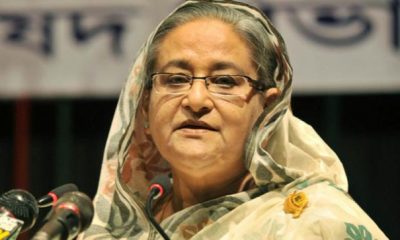World
Bangladesh PM wins UN environment prize

Dhaka: Bangladesh Prime Minister Sheikh Hasina has won a top UN environment award – Champions of the Earth (Policy Leadership category) – for 2015, the media reported on Tuesday.
The UN Environment Programme (UNEP) said Hasina will accept the award at a ceremony in New York on September 27, bdnews24 reported.
“This is in recognition of Bangladesh’s far-reaching initiatives to address climate change,” the UNEP said in a media release.
“Serving as Prime Minister of Bangladesh – one of the world’s least-developed countries – Sheikh Hasina has proven that investing in climate change is conducive to achieving social and economic development,” the release added.
Bangladesh is one of the world’s most populated countries (160 million) and one of the most vulnerable to the impacts of climate change.
Cyclones, floods and droughts have long been part of the country’s history, but they have intensified in recent years.
The Champions of the Earth award in the Policy Leadership category recognises “Bangladesh’s first-off-the-block initiatives under Prime Minister Hasina’s government to prepare the ecologically fragile country for the challenges it faces from climate change,” the UNEP statement added.
Bangladesh is also the first country to set up its own Climate Change Trust Fund supported by nearly $300 million of domestic resources from 2009-2012.
The government currently earmarks 6-7 percent of its annual budget – some $1 billion – on climate change adaptation, with only 25 percent of this coming from international donors.
A ‘Climate Change Fiscal Framework’ is also in the works to enable the government to track the demand and supply of climate change funds.
The annual Champions of the Earth award is the highest environmental accolade that the UN can confer upon outstanding individuals and organisations.
World
Lockdowns in China Force Urban Communities to Defy Censorship and Vent Frustration Online

Shanghai’s rich middle class is leading a wave of online dissent over the strict and prolonged lockdowns imposed in various parts of the country. Chinese internet censorship is struggling as patience is wearing thin in many urban centers, coming up with creative forms of online protests.
Social Media Posts Revealing Lockdown Tension in Shanghai
Drawn-out lockdowns are nothing new in China as authorities insist with the nation’s zero-Covid policy since the start of the pandemic. Currently over This time around, however, metropolitan areas like Shanghai are increasingly difficult to keep quiet, given that its more than 25 million residents have seen weeks of total isolation along with food shortages and many other service interruptions.
Dozens of towns and reportedly over 300 million Chinese citizens have been affected by lockdowns of different severity. As expected, urban netizens have been most outspoken over their difficulties by finding creative ways to get around state censorship and bans placed on topics, news comments and spontaneous campaigns.
Shanghai residents have been using mobile proxies and hijacking seemingly unrelated hashtags to talk about healthcare issues, delivery failures and the overall severity of their situation. The “positive energy” that the Chinese government wants to transmit during the recent prolonged series of lockdowns does not come naturally to those counting food supplies and online censors are working hard to filter words, trending topics and undesired social media sharing.
WeChat groups and message threads are under constant monitoring. Posts questioning the zero-Covid approach have been quickly deleted, including by leading Chinese health experts like Dr. Zhong Nanshan. Video footage is soon censored and protests and investigations are quickly made to disappear.
Where this has not worked, officials have exposed banners with warnings and outright threats like “watch your own mouth or face punishment”, while drones have been patrolling the city skies. Yet, if anything, this has led to further tensions and unspoken confrontation with Shanghai’s educated and affluent middle class.
Creative Online Solutions Harnessing Civic Energy
Announcements by Chinese social media that they would be publishing the IP addresses of users who “spread rumors” have not helped either. Tech industry research has shown that much of Asia’s tech-savvy population has a habit of using mobile proxies and other privacy tools, quickly finding workarounds to browse the internet freely and talk to the world about the hottest topics.
The sheer volume of forbidden posts is already a challenge for the very censorship system, experts explain. Unable to track all trending hashtags, state workers overlook topics that speak about the US, Ukraine or other popular news. Linking human rights elsewhere to their situation, Chinese online dissidents establish their informal channels and “hijack” the conversation to share personal or publicly relevant information about the Covid suppression in their town.
Sarcastic and satirical posts still dominate. Others hope to evade the censors by replacing words from famous poems or the national anthem. One thing is certain – social media, when harnessed with the right creativity, has proven its ability to mount pressure on the government in even some of the most strictly controlled tech environments like China.





















